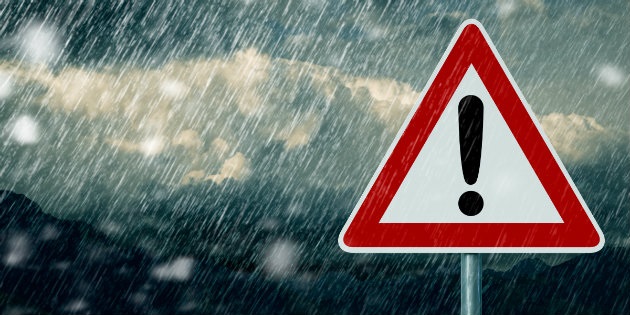We all think about the unknowns, the “what ifs”, of the future and prepare for them in a variety of ways. There are different schools of thought as to how much time or energy one should spend worrying about “what ifs” but we all agree that there’s prudence in not being caught completely unprepared. This is demonstrated by the billions of dollars Americans spend annually on insurance policies on everything from our health, our belongings, even our very lives. In every case we hope it’s a waste of money and we hope everything carries on the way it ought to… Yet the risk isn’t worth leaving yourself unprotected.
Asking “what if” about events that lay outside of your realm of control can be overwhelming. Who wants to contemplate catastrophes like earthquakes, floods, droughts, civil unrest or terrorist attacks? The fact of the matter is: out of sight, out of mind doesn’t mean its out of the realm of possibility. FEMA knows this, they recommend the average person should be prepared to wait up to 21 days for assistance to arrive. What is your insurance against being cut off from the outside world? Could you and your family survive for several weeks without electricity, water or trips to the local grocery store? This question can lead to inner panic, but we’d argue it should lead to action. This isn’t about betting that the world is going to fall apart, it’s about the peace of mind of knowing you won’t be caught completely unprepared IF something should happen.
Natural Disasters

Earthquakes
Earthquakes can pose a serious threat. Many experts say that the West coast is overdue for a big one, with the USGS predicting a 7% chance, and growing, of a magnitude 8+ within the next 30 years. The effects of earthquakes can range from minor vibrations or small shifts up to complete destruction of property, roads, and utility services. Should a large scale event take place it could take weeks for local and federal response teams to get to your area with even the most basic of supplies. With full utility restoration taking months.
http://www.fema.gov/earthquake – FEMA: About
http://www.fema.gov/earthquake-hazard-maps – FEMA: Hazard Maps
http://www.redcross.org/images/MEDIA_CustomProductCatalog/m4240216_Earthquake.pdf – Red Cross: Checklist
https://www.usgs.gov/ – USGS: About
http://emergency.cdc.gov/disasters/earthquakes/index.asp – CDC: About
http://www.opb.org/aftershock – OPB: Aftershock

Tornado/Hurricane
While Hurricanes mostly affect the east coast their effects can be felt across the nation. Activity in the gulf of Mexico sent gas prices up across the nation, and incidents of civil unrest occurred in areas where help took weeks to arrive. Tornadoes have a similar effect but can happen anywhere with little warning. The effects of sudden flooding and gale force winds will decimate any structure above ground and swamp any below.
http://www.ready.gov/tornadoes – FEMA: Tornadoes
http://www.nhc.noaa.gov – NOAA: Live Hurricane
http://emergency.cdc.gov/disasters/hurricanes/index.asp – CDC: Hurricanes
http://www.spc.noaa.gov – NOAA: Storm Tracker

Volcanic Eruptions
Volcanoes are natures time bombs that never stop ticking. Living in proximity to even a dormant volcano is very real threat. When Mount St. Helens went off over thirty years ago only a few people were caught in the blast radius, but many more were affected by floods, ash and logistical disruptions. There are several rumbling volcanoes on the west coast and precautions should be made to understand their possible fallouts (and their impact to you) should they suddenly roar back to life.
http://www.ready.gov/volcanoes – FEMA: About
https://www.usgs.gov/products/data-and-tools/real-time-data/volcanoes– USGS: About
http://emergency.cdc.gov/disasters/volcanoes/index.asp – CDC: Volcanoes
http://www.redcross.org/prepare/disaster/volcano – Red Cross: About
http://earthobservatory.nasa.gov/Features/WorldOfChange/sthelens.php – St Helens: Visual

Wildfires
While primarily a dry season concern Wildfires can affect everyone. Many people have lost their homes and lives due to the speed and ferocity of wildfires. If our climate continues to get dryer their frequency and impact will become far more pronounced. Even if removed from the wilderness you can still be impacted by the fire indirectly via air quality drought and logistical interruptions. Always have a bug-out bag instantly accessible.
http://www.ready.gov/wildfires – FEMA: About
http://www.forestsandrangelands.gov/communities/cwpp.shtml – CDC: WildFires
http://www.readyforwildfire.org/wildfire_action_plan – Wildfire Action Plan
https://www.iafc.org/topics-and-tools/wildland– IAFC: Action Plan

Drought
Unfortunately, drought is in the “what if” category for the West Coast as it is now a reality that many have to deal with and prepare for. The combination of lower rain/snowfall and higher temperatures has put the west into a multi-year drought compared to what we once knew. Present in California for over four years, the situation has continued to move northward into Oregon and Washington as well, heavily impacting the farming industry throughout the region. No matter where you live you should store water in winter for months of rain free days in summer.
http://www.ready.gov/drought – FEMA: Droughts
http://www.drought.gov/drought – Drought Monitor
Man-Made Disasters

Industrial Disasters
Mankind has long labored to harness the power and resources of the world around us. While modern industry places a firm onus on safety and reliability these measures are often imperfect and prone to failure. This fact is perhaps most evident when reviewing the Fukushima nuclear reactor failure in 2011.
Similarly there are a host of dangerous energies, chemicals and products being transported or used in our areas, and it would behoove us to be aware of them and understand their impacts should the worst happen.

Economic Downturn
The memories of the great recession of 2008 are still fresh in the minds of most Americans. From job loss, home foreclosures, and bankruptcies those events shook our lives. Even those insulated from the worst of this downturn still found their lifestyles and spending habits forever changed.
If we did not before, most of us now recognize that excessive personal and governmental spending will always come back to bite us. The best question you can ask yourself is: “Have I prepared my finances to weather a future storm?”

Civil Unrest/ War
Often Civil unrest comes in conjunction with some other form of hardship or shock, be it a natural disaster or political/social swelling. As much as we would like to think a community will come together in a time of crisis we have unfortunately seen that this is not always the case.
With more countries becoming nuclear powers and unstable ruler’s threats going viral in seconds we must not count out regional or global wars. It is estimated that if an electro-magnetic pulse(emp) is set off over America it would wipe out our power grid and 90% of Americans would die in the first year. No food, water, sanitation, law etc. A real dangerous technology and a real reason to prepare your family for the effects of hate.

It is important to consider that you may find yourself in a position where leaving your home may be the only option due to local instabilities. Having a bug out bag for everyone in your family and a weapon is advised.
Food/Water Security
Food Security

Food security and quality is one of the major items of concern we have here at Resilient Living, LLC: There is no question that the cost of food is on the rise, averaging a 2.8% increase every year since 2000. This is a rate in excess of inflation or the average workers pay raise. As such the average American is paying more to feed themselves every year!
There are also a great many questions surrounding the quality of modern food industry. What are the effects, if any, of genetically modified foods? What does the use of excessive amounts of pesticides and preservatives have on my health? Is my food grown in a sustainable and humane way? Why are food allergies increasing at such alarming rates, is it linked with my diet and/or lifestyle?
Finally there are concerns regarding the food supply in general. How is the drought along the west coast and the mid-west going to affect the food supply? Where is my food coming from, does it travel around the globe before reaching my plate? Are there enough stores of food at the grocery to support my community in the case of a disaster?
We insure almost everything except our ability to eat. The only way to do that is to have long term food stored on site and heirloom seeds for the future.
The human body can only survive for 3 days without water and 3 weeks without food. And that is only true if you are not sweating or exerting energy.
Water security
Our globe is covered in water and yet drinking contaminated water during an emergency situation is a leading cause of sickness and death. Many natural disasters can turn what were once clean water sources into polluted disease pits. Always have the ability to filter and treat water. 3 days without water is all you have.
It is important to store water and treat it with nano-silver today and recycle it every couple years. Remember that most water barrels are plastic and if shot, months of stores can drain in minutes. Store in places not in the line of fire.
Motivation
We recommend you try fasting water for one day or food for three (if physically able). You will then appreciate what slight deprivation feels like and can imagine what weeks could and would feel like. I guarantee it will motivate you to get started and your family will be glad you did.
http://www.ers.usda.gov/data-products/food-price-outlook.aspx – USDA: Food CPI
http://www.cdc.gov/nchs/data/databriefs/db121.htm – CDC: Allergy Rate
http://www.resilience.org/stories/2013-07-22/the-energy-cost-of-food – Food Energy Cost
http://www.cuesa.org/learn/how-far-does-your-food-travel-get-your-plate – Food Travels
What If you were ready?
What if you had a fully thought out plan of action involving a community of people with diverse skills ready to bug out to a secure location stocked with all the supplies your family needed to survive for months or even years?
RL Recommendation:
Set a meeting with your family and make a plan of action for each event mentioned above. Where will you all go? What is your route? How will you communicate? Learn more here>>


